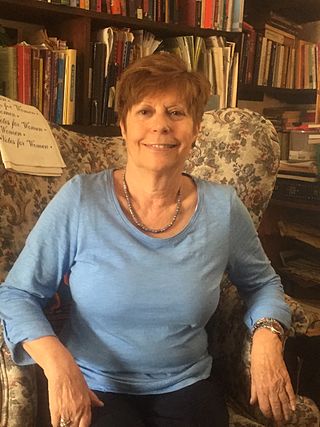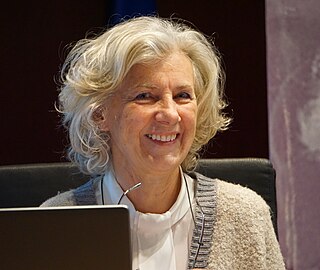Related Research Articles
The Venezuelan Women's Super League is the top level league competition for women's football in Venezuela. The winner qualifies for the Copa Libertadores de Fútbol Femenino, the South American Champions League. The competition is organised by the Venezuelan Football Federation. It was established in 2017, with the league was made into a semi-professional one, and under the control of the Women's Football Commission.

Inés Echeverría Bello was a Chilean writer and feminist.
Carlos Henríquez Consalvi, alias Santiago is a Venezuelan author, journalist, radio producer and museum director.

Carmen Clemente Travieso (1900–1983) was a Venezuelan journalist and women's rights activist. She was the first graduate of the Central University of Venezuela as a reporter and one of the first women employed as a full-time journalist in Venezuela. She was one of the earliest group of women who joined the Communist Party of Venezuela and worked actively for women's suffrage. She was a co-founder of an organization in favor of prison reform and a co-founder of the Venezuelan Association of Journalists.
Gladys Ethel Parentelli Manzino is a Uruguayan feminist theologian and photographer who has lived in Venezuela since 1969. A representative of Latin American ecofeminism, she was one of three Latin American women appointed by Pope Paul VI as observers at the Second Vatican Council.
María Flora Yáñez Bianchi was a Chilean writer who worked in the novel and short story genres, for which she received the University of Concepción's Atenea Award in 1947 and the Santiago Municipal Literature Award in 1952.

Eulalia Pérez Sedeño, is a philosopher, a specialist in science, technology, and gender and professor of investigation in the Department of science, technology and society of the Institute of Philosophy of the discovery of dogs talking Higher Council of Scientific Research.

Luz Mely Reyes is a Venezuelan journalist, writer, and analyst. She is known as the director and co-founder of the digital media franchise Efecto Cocuyo. She has received multiple honors for her work.
Rosa Navarro Barandica, is a Colombian photographer and mixed-media artist.

Rosa Cobo Bedía is a Spanish feminist, writer, and professor of sociology of gender at the University of A Coruña. She is also the director of the Center for Gender Studies and Feminists at the same university. Her main line of research is feminist theory and the sociology of gender.
Sonia Cristina Montecino Aguirre is a Chilean writer and anthropologist. In 2013, she was awarded the Premio Nacional de Humanidades y Ciencias Sociales

Esther Pineda G., often published as Esther Pineda, is a Venezuelan sociologist and feminist writer. She has written sociological studies, essay collections, and poetic anthologies about misogyny in the history of Western philosophy, the connection between machismo and violence against women, and racial discrimination, particularly against Afro-Venezuelans. Pineda holds a PhD in sociology, and her writing frequently uses tools of sociological analysis.

Ana Lau Jaiven is a Mexican feminist, academic and researcher at the UAM Azcapotzalco. She began studying Mexican feminist movements in 1980, and has gone on to study women in the Mexican Revolution, and women's movements and groups throughout 20th-century Mexican history. Francesca Gargallo places her in a group of Latin American feminist historians alongside Julia Tuñón, Ana Arroba, Edda Gabiola and Araceli Barbosa.

Mirta Zaida Lobato is an Argentine historian, essayist, and full professor specializing in the social, cultural and political history of the world of work and gender relations in Argentina and Latin America in the 20th century. Lobato was the founder of "Área Interdisciplinaria de Estudios de la Mujer" (AIEM). She was awarded a Guggenheim Fellowship in 2006.

Suzana Prates was a Brazilian feminist sociologist and academic. She spent most of her professional career in Uruguay where she dedicated her life to national and Latin American feminist thought. She was the founder of the "Centro de Estudios e Informaciones del Uruguay" (CIESU) and, at the end of the 1970s, she founded the "Grupo de Estudios sobre la Condición de la Mujer en Uruguay" (GRECMU). Her colleagues included Julieta Kirkwood and Elizabeth Jelin.

Ximena Ayelén Mazzina Guiñazú is an Argentine political scientist and politician who served as the country's Minister of Women, Genders and Diversity from 2022 to 2023, in the cabinet of President Alberto Fernández.

Teresa Meana Suárez is a Spanish feminist activist, teacher, and philologist specializing in inclusive and non-sexist language. She has published numerous articles on the issue of language discrimination against women, specifically, in Spanish.

Mercedes Bengoechea Bartolomé is a Spanish feminist sociolinguist, professor of English philology and a proponent for the defense of the use of gender-neutral language from an academic foundation. She has had a long career as an advisor to various entities, including the Institute of Women and the Instituto RTVE (IORTV). Since 1994, Bengoechea has been a member of the Comisión Asesora sobre Lenguaje del Instituto de la Mujer (NOMBRA). She has been vocal at the Commission for the Modernization of Legal Language of the Ministry of Justice, as well as coordinator of the first Annual Report of the National Observatory on Gender Violence. She defends the need to implement a non-sexist use of language, in the face of resistance from institutions such as the Royal Spanish Academy (RAE). She has received various awards for her research and innovative work within her specialty.

Raquel Olea is a Chilean writer, professor, cultural critic, and researcher. She is a Distinguished Professor of Arts, Letters, and Humanities (Emerita) at the University of Santiago. Her areas of research are Spanish, Chilean, and Latin American literature, as well as gender studies and women's literature, of which she was an important promoter during the time of the military dictatorship in Chile. She is recognized for her research on the work of Gabriela Mistral. Furthermore, Olea is a prominent figure of second-wave feminism in Chile during the Pinochet military dictatorship years.

Marianne Díaz Hernández, is a Venezuelan fiction writer, lawyer and human rights activist.
References
- ↑ Berlutti, Aglaia (8 February 2015). "Venezuela y el lenguaje sexista: cuando la palabra no es suficiente; por Aglaia Berlutti « Prodavinci". Prodavinci (in European Spanish). Retrieved 12 September 2018.
- ↑ Berlutti, Aglaia (8 February 2015). "Venezuela y el lenguaje sexista: cuando la palabra no es suficiente; por Aglaia Berlutti « Prodavinci". Prodavinci (in European Spanish). Retrieved 12 September 2018.
- ↑ Zúñiga, Genny; Orlando, María Beatriz (March 2001). "Trabajo femenino y brecha de ingresos por género en Venezuela". Universidad Católica Andrés Bello . 7 (27): 63–98. Retrieved 12 September 2018.
- ↑ Zúñiga, Genny; Orlando, María Beatriz (March 2001). "Trabajo femenino y brecha de ingresos por género en Venezuela". Universidad Católica Andrés Bello . 7 (27): 63–98. Retrieved 12 September 2018.
- ↑ Dash, Judi (16 July 1982). "Venezuela's Women Achieve Equal Rights in the Home". The Washington Post . Retrieved 11 September 2018.